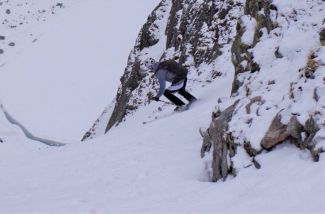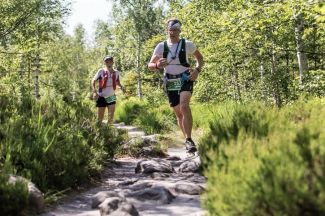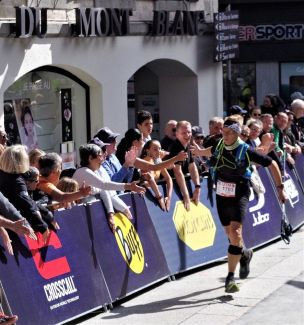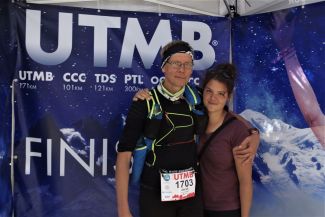Since 1981, he has worked at the Institute of Mathematics at TUL. In 1987, he was awarded the degree of Doctor in Mathematics at Lodz University of Tecnology. In 2000, he received his postdoctoral degree at the Faculty of Mathematics, Physics and Chemistry, at University of Silesia. In 2011 he was nominated professor.
Prof. Jachymski is one of the world's leading experts in the theory of fixed points. He is in the top 2% of most cited scientists in the world. Since 1978 he has been a member of the Academic Mountaineering Club, and since 1992 he has been an instructor of the Polish Mountaineering Association. His current non-scientific passions are skiing and mountain ultramarathons.
Your adventure with mountains began during your studies. At that time you were only involved in mountaineering?
I started with cave mountaineering, because I thought I had a fear of heights, and in caves at least there was no exposure. The adventure with caves, however, lasted only a year and a half. When I became convinced that I could handle the exposure, in 1979 I finished a mountaineering course on Hala Gąsienicowa. For the next 15 years I focused on climbing, also in winter, in the Tatra Mountains, Alps and Dolomites. During that time I climbed, among others, the main Tatra ridge in 11 days and a 1000-meter wall of Marmolada in Dolomites.
The trips abroad were possible thanks to high-altitude work, which was very well paid at the time. I remember that I once painted a 160-metre chimney in a combined heat and power plant EC2, next to the building of my institute, working in a team with a strong scientific potential: two doctors of mathematics and physics (now full professors at PŁ) were hanging on the rope next to me, and next to them, in turn, an MA in philosophy and a doctor of chemistry.
You were also successful in ski touring. In 2012/13 season you won third place in Polish Amateur Cup in your age category.
Ski touring is definitely one of my most important passions. This type of skiing gives you a special feeling of freedom: you are away from the hustle and bustle of the ski resorts, you have huge, often untouched slopes to trace your tracks on, and you can move quickly through the terrain. This sport, however, requires a high level of physical condition and mountain experience due to the avalanche danger, as well as technical difficulties that have to be overcome both during the hike up - often using crampons and an ice axe - and during the descent itself.
Descents down the Tatra couloirs give me great emotions. The most difficult ones require full concentration and faultless driving, because a possible fall in such steep terrain can lead to a slide of several hundred meters, which can have fatal consequences. I remember that a few years ago, standing over the depths of a gully descending from Orla Perć, which I was supposed to use to descend, a dark thought crossed my mind: if I make a mistake here, the Faculty of Technical Physics, Information Technology and Applied Mathematics will lose the right to grant a postdoctoral degree. This was because at that time we had the minimum number of independent researchers necessary to maintain these rights. This thought made me extremely concentrated and the congress was flawless. Fortunately, at present we have a considerable surplus of independent researchers and such thoughts no longer burden me before the conventions.
All your passions are connected with mountains and they change depending on the seasons. Mountain ultramarathons - this is probably the one you devote the most time to? Since 2014 you have participated in as many as 34 events.Indeed, apart from the winter period dominated by ski touring, my great passion is ultra distance mountain running. However, I also participate in shorter mountain runs - 20 or 30 km long, but the greatest satisfaction for me comes from ultra mountain runs, that is, runs longer than a marathon distance. The first was the Table Mountain Supermarathon of 50 km, which I ran in 2014. However, I consider my first real ultra to be the Ultra Border Run of the Tatra Mountains at a distance of 72 km, with a total of 5000 m of ascent, with great technical difficulty, in which I was the fastest among runners aged 50+. That was 2015, and since 2016 I have completed 10 runs over 100 km, including 5 over 150 km, and my longest run was 240 km.
In ultramarathons you often occupy podium places in your age category. In 2017, you ran in the famous ultra version of the Butcher's Run, covering 161 km. For the average person, this task seems impossible. Where do you draw your energy from?
In the mountains I learned to learn about my body's capabilities. Many times during long climbs I would reach what I thought was the state of extreme exhaustion, but then it turned out that I was still able to endure many hours of intensive effort.
In the mountains you often have to spend hours in the pouring rain or hurricane wind that sometimes doesn't even allow you to crawl. Thanks to my mountain experience, I finished the mentioned Butcher's Run at 161 km. Before the evening the weather broke down with thunderstorm and heavy rain, the temperature dropped dramatically and most of the runners withdrew from the competition due to chill. As a result, only 7 more people finished the run besides me.
In similar circumstances, I finished the 150km Lemkowyna Ultra Trail run in 2016, during which it rained for more than 12 hours and torrents flooded the route to such an extent that we were wading many times up to our knees in water at a temperature of 3 degrees.
In 2019, you took part in the Lower Silesian Mountain Running Festival, competing in the Race of 7 Summits. You covered the route of 240 km with a total ascent of 7700 m in a time of 46 hours and 50 minutes. This was the third result in your age category.
2019 was the best year of my running career, although I owe these high places to my transition to the M60 category. I started with 3rd place in this category in the Polish Skyrunning Championships held in the Tatra Mountains, then I was 2nd in the Table Mountain Supermarathon, 3rd in the Run of 7 Peaks, and finally 1st in Ultra Janosik, a technically difficult 110 km run with a bold route through Spisz and the Slovak Tatras, including sections with chains and buckles.
During the Race of the 7 Peaks I also set my own record in functioning without sleep: I lasted 64 hours, although on the second night of the competition I took naps of a few seconds during the march. However, I didn't manage to eat a full dinner after the run: I fell asleep in the tent with a sandwich in my hand and a headlamp on, and I finished dinner (or started breakfast) at 5 am.
Because of my injured feet I had problems with walking for a long time, so I switched to bicycle and 4 weeks later I cycled in 29 hours two loops (in different directions) around Tatra mountains, covering 410 km with 5200 m ascents. I cycled the first loop alone at night, and the second one during the day with my daughter, who watched over me to make sure I would not fall asleep on the bike.
You also participated in an alpine ultramarathon. Was it your most difficult mountain run?In 2018, I competed in the UTMB run, or Ultra-Trail du Mont Blanc. It is considered one of the most difficult mountain runs in Europe: it is 171 km long and the sum of approaches is 10000 m. This means that on average you have to climb 22 floors for every kilometer. The route goes around the Mont Blanc massif through the territory of France, Italy and Switzerland. The start and finish are in the town of Chamonix in France. About 2.5 thousand competitors from dozens of countries from all over the world take part in UTMB. The Polish team consisted of about 100 runners in 2018, and I was the oldest person in this group.
This was my toughest mountain run. After 24 hours from the start, in the Swiss town of La Fouly at km 108, I lost strength and started to suffer from digestive problems. However, after an hour break I moved on and for the next 10 hours I walked without food, drinking only bitter tea at the checkpoints which hardly quenched my thirst. I was more and more dehydrated and exhausted.
From the 120th km of the UTMB it became a run with obstacles: every few hundred meters I jumped over bodies of other competitors lying on the route - I tried to assume that they were just sleeping, but even if they were not, in my condition I could not help them. I began to understand Himalayan climbers abandoning their partners during a dramatic descent from an eight-thousander.
At 5 a.m., already in France at 150km, the miracle happened: my appetite returned and, after a big breakfast, I started to run frantically, apparently in a state of euphoria. This is how I ran the last 21 km, reaching the finish line after 41 hours and 45 minutes, i.e. 5 hours before the limit. The last kilometer of UTMB provides extraordinary emotions: on the route there are crowds of supporters cheering as if one was running for victory. In this race virtually everyone who finishes it is a winner - the time achieved is of secondary importance.
In an account, you wrote "In ultra running, only the first 70 km are run by muscle power. The rest is done with the power of the mind. That is why I love ultra running, especially when I am past the 70 km mark". How do you explain it, what is going on in your strict, mathematical mind?
After 70 km my body usually sends me signals that it is tired, encourages me to move slower or even to retreat at the nearest checkpoint. At UTMB, during a forced stop in La Fouly, when I hit a slump, I was tempted by an image - I was lying comfortably on a hospital bed while a French nurse caringly administered another IV to me.
It was completely destructive and at such moments one has to unleash all the powers of the mind to fight this state. Then I start some kind of internal dialogue with myself, trying to motivate myself to keep running. This is very fascinating and sometimes requires cunning to deceive my own protesting body. Then, in La Fouly, I managed to suppress the above vision with the image of myself crossing the finish line in Chamonix, so I kept going.
You enjoy great authority among your colleagues in the scientific field. You are also greatly admired for your achievements in your passions. Do you have followers in your immediate academic circle or family?
Indeed, I infected several of my young colleagues from the Institute of Mathematics with my passion for running. Most of them compete mainly in street running, but my former doctoral student got involved in mountain running.
I also infected all three of my children with mountain passions. Actually, I think they had no other choice: my wife and I carried them in baby carriers in the Tatra Mountains when they were little more than a year old, and from the age of four they were moving in the mountains without our active support. They also started skiing at that age. All of them now take part in mountain runs, admittedly on shorter distances, but one of my sons has already completed an 85 km mountain run last year. All three are also ski touring, and in 2015 I climbed three Alpine four-thousanders in 12 days with my son and daughter, including Mont Blanc. So there is a good chance that mountain passions will continue in my family.
Why is it important to have passions in life?
Passions made me realize what an amazing machine the human body is. Most of us are unaware that we have tremendous physical power within us - we have limitations in our minds that block us, preventing us from unleashing that power.
On the other hand, through my passions I have realized what computer gamers experience: I have been given several lives. I assume that my first one ended when I was 24 years old, when during a winter climbing trip in the Tatra Mountains I fell from a ridge into an abyss and, after a hundred-meter flight, fell into a gully, in which I managed to brake with an ice-checker just before the place where it peeled off. It was only due to the lucky configuration of the terrain that I made it out alive. My second life lasted only 3 years: after a difficult climb in the rocks I made a fatal error in handling the equipment, as a result of which the rope on which I was lowered jumped out of the harness and I miraculously managed to catch myself by the loop attached to the hook. After this adventure I felt like I was born again.
Despite the fact that I have a lot of experience - 44 years of intensive and diverse mountain activity - I realize that there are no infallible people and I can, while realizing my passions, make another cardinal mistake, as it happened to me twice in the past. Will I get another life then? I don't know if I deserve to be so singled out by a higher power.
Finally, I want to reassure my superiors that mathematics is still my passion and I still feel a strong cognitive hunger, which is necessary for effective scientific research. My passions complement each other: my knowledge of science helps me develop a strategy for mountainous endeavors, and on the other hand, I sometimes experience a kind of illumination during light jogging or cycling workouts that allow me to think about mathematics. Then, when I get home, I quickly write down the details of the construction that revealed itself to me during the workout.
Interviewed by Małgorzata Trocha




